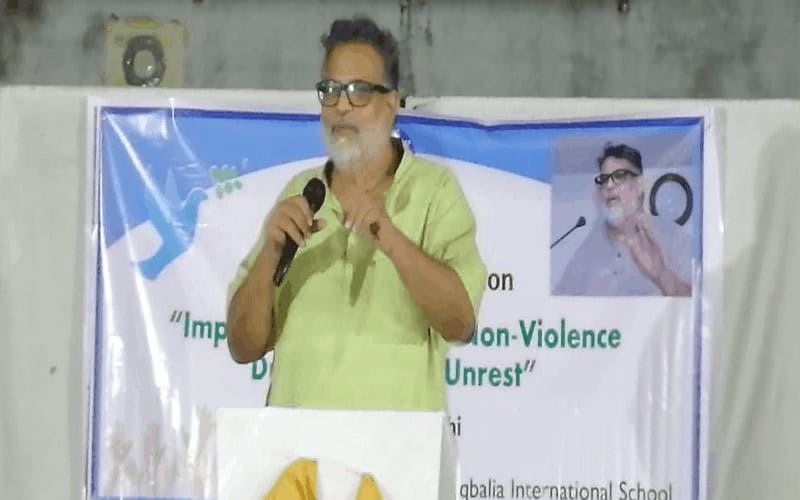Hyderabad: As India has seen some of the biggest protests in four decades, the image and legacy of Gandhi, known as the “father of India” for his role in independence, has been omnipresent. “People have been voicing fears against the new Citizenship (Amendment) Act passed by Prime Minister Narendra Modi’s right-wing, Hindu nationalist BJP-lead government which risks destroying the secular, pluralistic India that Gandhi dedicated his life to the building,” said, great-grandson of Mahatma Gandhi.
During the talk “Importance of Peace and Non-violence During Times of Unrest” organized by Indialogue Foundation at Iqbalia International School in Hyderabad on Monday night, Tushar Arun Gandhi, President of Mahatma Gandhi Foundation said, “Laws or systems are being attempted to be imposed – ones which discriminate, differentiate, on the basis of religion.” Today we are again fighting a battle of right against might, so it’s very natural that Gandhi becomes the icon of the protest.
Speaking eloquently on the topic, Tushar highlighted the significance and relevance of non-violence and peace in times of strife. He explained why it is important to stick to the non-violent methods if one has to sustain a struggle for a just cause. Depending on violent means only results in failure of the struggle, irrespective of whether the cause is just.
Tushar Gandhi has dedicated much of his life to his Great-Grandfather’s legacy by establishing and running the Mahatma Gandhi Foundation in Mumbai. However, he said with the passing of the new citizenship law something had shifted. “Everybody has a turning point in their life. If being thrown out of the train was a turning point in my great-grandfather’s life, I think this issue of trying to change the soul of my nation is the turning point in my life,” he mentioned.
Further in his talk, he stated that “In 10 years his country won’t be India anymore. It will be a fascist dictatorship. And, mind you, it will be a dictatorship using the democratic process, and that is even more dangerous”.
Under the new legislation, all Hindu, Christian, Jain, Buddhist and Sikh migrants from Bangladesh, Pakistan, and Afghanistan before 2014 will be given Indian citizenship.
Though, the same will not apply to Muslim immigrants. In conjunction with a planned initiative to begin a National Register of Citizens (NRC), where every person in India will have to present paperwork to prove their Indian lineage, the new act will most like to single out Muslims in India as “infiltrators.” This will lead to deportation or imprisonment into detention centres being built across the country.
Tushar spoke of his pride at seeing Gandhi’s image being brandished as thousands of protesters defied bans on public gatherings by the authorities and took to the streets in a wave of peaceful mass civil disobedience reminiscent of Gandhi’s movement 90 years ago.
“Just think of the far-sightedness of that man in 1930,” said Tushar. “When he was asked to send out a message to mankind, he wrote, ‘I want world sympathy in this battle of right against might’ and today we are again fighting a battle of right against might, so it’s very natural that he becomes the icon of the protest.”
He was also adamant that the effects of the citizenship act would be felt far beyond India’s borders.
“There should be a debate on the ramifications of the CAA internationally,” says Tushar. “It concerns every democracy and everybody who believes in inclusivity and in the liberal ideology.”
While Prime Minister Narendra Modi has often described himself as a follower of Gandhi, Tushar said that this was meaningless in the face of the Hindu nationalist agenda being pushed by Narendra Modi’s BJP government, which aims to irreparably fracture the country down religious lines. “It’s not what you profess, but what you practice that makes the world realize who you follow,” he said of Modi.
Over a week since the passing of the citizenship act, the protests in India have shown no sign of abating and indeed have gathered even more momentum over the weekend. Like so many, Tushar Gandhi said he would keep turning out on the streets to fight for an India where religion did not determine your status as a citizen.
“We will have to keep up the momentum, we will actually have to increase the intensity of the protests if we are to bring this government to its knees,” he said. “Because you must remember this is an arrogant government. It is not going to come to its knees that easily.”
While the authorities are increasingly meeting the protests with suppression and violence, Tushar said it was more important than ever that Gandhi’s legacy remains at the heart of the protests.
“A long-drawn-out agitation can only be sustained if it is peaceful and non-violent,” he said.
During the Q&A session, when the siasat.com reporter asked Tushar Gandhi why is that the police in the country are being heartless with the protestors, Tushar replied, “There is no moral and ethical values leadership in the country that can control the protests, even the police force has become the servants of this government in power, they should keep in mind that they serve the Indian constitution not the government of India. The civilians are terrified of police but the police will have to wake up one day. The only way I suggest to the police that they should also be ethically educated is the only way left now police have to be reform in spite of brutally attacking civilians.”
The talk was attended by people from different walks of life. The secretary-general of Indialogue Foundation Mr. M Behzad Fatmi and others participated.

